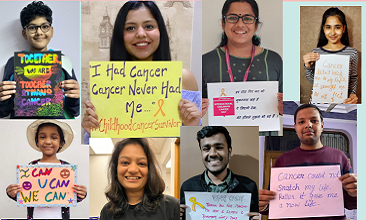
Journey of treatment of childhood cancer is one of the most fascinating success stories of modern cancer practice. We have witnessed a remarkable improvement in outcome of children with cancer in developed countries and this success has not been replicated in our part of world. Late diagnosis due to lack of awareness in parents and health care providers often leads to neglect of symptoms and is major deterrent to successful outcome. According to Dr. Sandeep Jain, Senior Consultant Pediatric Hematology and Oncology – Rajiv Gandhi Cancer Institute & Research Centre, the most common forms of cancer occurring in children include leukemia (blood cancer), lymphoma, brain, bone and kidney cancer. Surrounded by a multitude of myths about its occurrence, symptoms and treatment, the cancer cure is delayed due to lack of awareness and misconceptions. Identifying and dispelling these misconceptions about childhood cancer is critical. Below are some common myths about childhood cancer:
Myth #1 – Cancer does not happen to kids.
Fact – Age is no bar for the occurrence of cancer. This is the biggest myth and concern as parents do not watch out for symptoms or physical changes in their children. Though Cancer is rare in children, every 3 minutes a child is diagnosed with cancer worldwide. In India, about 50,000 new cases of childhood cancer are diagnosed every year.
Myth#2-Children with cancer are always sick and critically ill at diagnosis.
Fact- Many a times signs and symptoms of childhood cancer are not very specific. These may be same as we encounter in day to day common illnesses. Therefore, high index of suspicion is must for early diagnosis.
Myth#3- Diagnosis of childhood cancer is difficult and expensive and biopsy can spread cancer.
Fact- Most of the time childhood cancer can be identified with simple tests like complete blood count, ultrasound and x-Ray. For confirmation, sometimes we need to perform specialized test like bone marrow aspiration and biopsy. It’s a common myth that biopsy may spread cancer. Biopsy is for diagnosis of underlying cancer. Proper biopsy by an expert never upstages the tumor.
Myth #4– If the mother or father has cancer, their child will also develop the disease.
Fact – Though cancer is caused due to changes in the DNA, it is not always hereditary. In fact, only a small percentage of cancers are inherited. Several other factors can bring about the genetic changes leading to cancer.
Myth #5 – Injuries or weak immunity can cause cancer.
Fact – An injury can almost never cause cancer. Visiting a doctor for treating an injury may lead to detection of a tumor. It would have already been present and close examination simply revealed it. Compromised immunity does not cause cancer in most of cases. On the contrary, cancer and its treatment lead to compromised immunity.
Myth# 6- Children shouldn’t be told that they have cancer.
Fact- It is extremely difficult to hide the diagnosis of cancer from our children in this modern information age. Instead, this may be a great opportunity to educate our children on the science of human diseasesand the progress we have made. In addition, valuable lessons on personal hygiene, nutrition and general knowledge on health could be inculcated in the process.
Myth #7 – Some cancers are contagious and pose a health risk to other children.
Fact –Cancers are never contagious. In reality, patients and families that have a child recently diagnosed with cancer need more support than ever before. So we need to break this stigma and really bring communities together to support these families.
Myth #8 – Children with cancer remain confined to bed.
Fact – Those undergoing medical treatment for cancer can resume normal activities alongside the treatment. Kids can, in fact, even begin going to school and continue with their regular routine. This also helps them recover faster and not feel isolated. We often set patients and families up for the expectation that they should lead as normal a life as possible during treatment.
Myth#9- Children with cancer will have poor quality of life after treatment is over.
Fact- Although a transient isolation during treatment from peers may stunt their social development, many childhood cancer survivors have proven their ability to adapt, learn and grow to become functioning members of our society. Most childhood cancer survivors go on to lead healthy normal lives just like their peers.
Myth#10– Childhood Cancer is mostly fatal.
Fact –Many children face a tough road. Children are frequently more resilient in handling aggressive treatment, like chemotherapy. They are able to withstand and recover sometimes better than adults. Childhood cancer can be treated with a reasonably good chance of cure. About 3-quarters of the children who are diagnosed with cancer will be able to live and grow into adulthood with contemporary treatment. The best thing to tell families facing this is not to lose hope and it’s definitely not a death sentence anymore.
As a society, RGCIRC is looking forward to get support from generous people
Read MoreIt is a fact that there are absolutely no substitutes to replace human bloo...
Read MoreVolunteers play an important role in today’s hospitals. They help the hos...
Read MoreRajiv Gandhi Cancer Institute & Research Centre is today counted amongst Asia’s premier exclusive cancer centres that offer unique advantage of cutting edge technology, put to use by renowned super specialists. This potent combination of man and machine ensures world-class cancer care to not only patients from India, but also from the neighboring SAARC countries and others.
D - 18, Sector - 5, Rohini, Delhi - 110085 | +91-11-47022222 OPD Timings: 09:00 am to 05:00 pm (All weekdays except Sunday and Holiday) Emergency Services: 24x7 All weekdays
Mahendra Kumar Jain Marg, Niti Bagh, New Delhi - 110049 | Tel: +91-11-45822222 / 2200 OPD Timings: 09:00 am to 05:00 pm (All Weekdays except Sunday and Holiday) Emergency Services: 24x7 All Weekdays